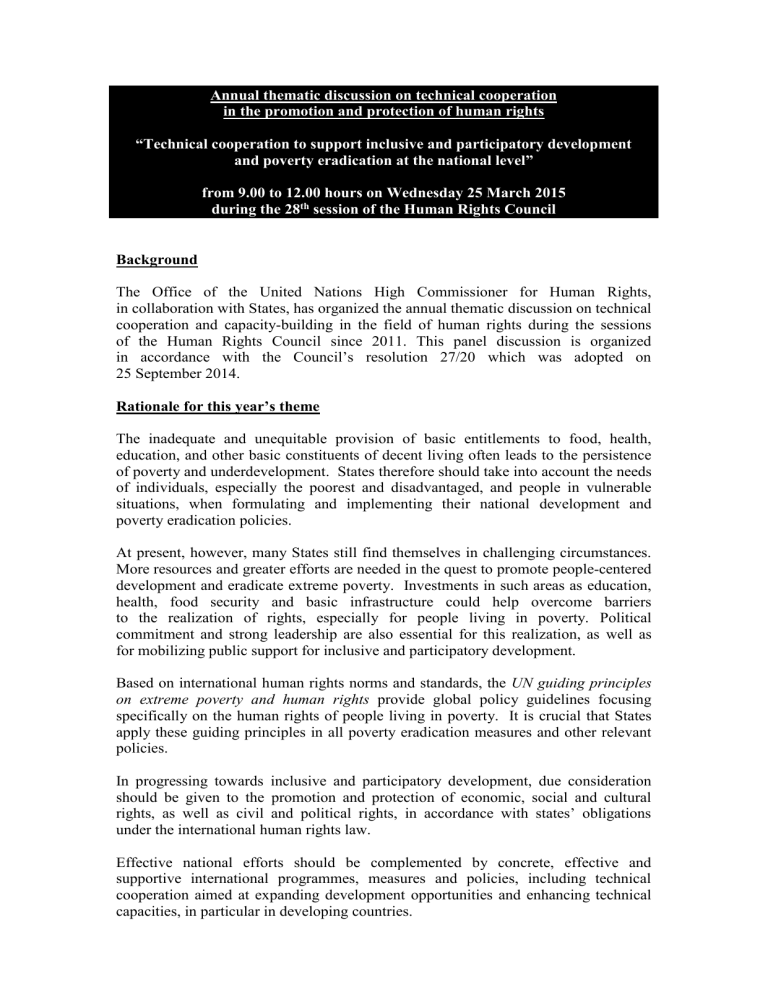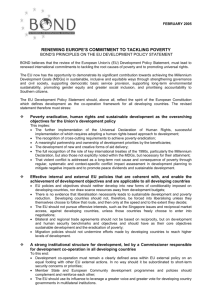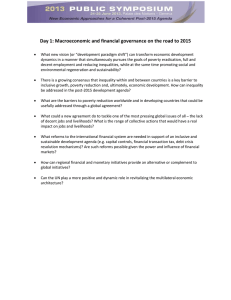Annual thematic discussion on technical cooperation

Annual thematic discussion on technical cooperation in the promotion and protection of human rights
“Technical cooperation to support inclusive and participatory development and poverty eradication at the national level” from 9.00 to 12.00 hours on Wednesday 25 March 2015 during the 28 th session of the Human Rights Council
Background
The Office of the United Nations High Commissioner for Human Rights, in collaboration with States, has organized the annual thematic discussion on technical cooperation and capacity-building in the field of human rights during the sessions of the Human Rights Council since 2011. This panel discussion is organized in accordance with the Council’s resolution 27/20 which was adopted on
25 September 2014.
Rationale for this year’s theme
The inadequate and unequitable provision of basic entitlements to food, health, education, and other basic constituents of decent living often leads to the persistence of poverty and underdevelopment. States therefore should take into account the needs of individuals, especially the poorest and disadvantaged, and people in vulnerable situations, when formulating and implementing their national development and poverty eradication policies.
At present, however, many States still find themselves in challenging circumstances.
More resources and greater efforts are needed in the quest to promote people-centered development and eradicate extreme poverty. Investments in such areas as education, health, food security and basic infrastructure could help overcome barriers to the realization of rights, especially for people living in poverty. Political commitment and strong leadership are also essential for this realization, as well as for mobilizing public support for inclusive and participatory development.
Based on international human rights norms and standards, the UN guiding principles on extreme poverty and human rights provide global policy guidelines focusing specifically on the human rights of people living in poverty. It is crucial that States apply these guiding principles in all poverty eradication measures and other relevant policies.
In progressing towards inclusive and participatory development, due consideration should be given to the promotion and protection of economic, social and cultural rights, as well as civil and political rights, in accordance with states’ obligations under the international human rights law.
Effective national efforts should be complemented by concrete, effective and supportive international programmes, measures and policies, including technical cooperation aimed at expanding development opportunities and enhancing technical capacities, in particular in developing countries.
- 2 -
It is thus now high time to review the progress made in promoting the empowerment and realization of the rights of the poorest and disadvantaged, and people in vulnerable situations, to explore ways to further promote development for all, and to improve international technical cooperation and capacity-building programmes to support inclusive and participatory development and poverty eradication at the national level.
Objectives
To exchange views on how state obligations under international human rights law can be taken into account in devising national development policies and poverty reduction strategies.
To discuss best practices, lessons learnt and challenges in the implementation of national development policies and poverty reduction strategies in a nondiscriminatory, participatory, transparent and accountable manner.
To identify gaps in development policy frameworks and make recommendations to ensure that national development plans respond to the needs and promote the empowerment and realization of the rights of the poorest and disadvantaged, and people in vulnerable situations.
To examine the role of international cooperation in the promotion of participatory development and poverty eradication, including measures and programmes aimed at expanding development opportunities and enhancing technical capacity.
To explore constructive ways to further enhance effectiveness of the technical assistance provided by the Office of the United Nations High Commissioner for Human Rights at the request of States to support inclusive and participatory development.
Date and venue
This panel discussion will take place in Room XX of the Palais des Nations in Geneva from 9.00 to 12.00 hours on Wednesday 25 March 2015 during the 28 th session of the Human Rights Council.
Tentative programme
Chair and welcoming remarks
H.E. Mr. Joachim Ruecker
President of the Human Rights Council
Opening statement
Mr. Anders Kompass
Director of the Field Operations and Technical Cooperation Division
Office of the United Nations High Commissioner for Human Rights
- 3 -
Presentations
Introductory statement / Introduction of panellists
Moderator H.E. Mr. Thani Thongphakdi
Ambassador and Permanent Representative of Thailand to the United Nations Office and other international organizations in Geneva
Human rights and development: Towards mutual reinforcement
Mr. José Manuel Fresno García
Director and Founder of Fresno, The Right Link, and Member of the Scientific
Committee of the European Union Agency for Fundamental Rights
The role of national human rights institutions in promoting the realization of rights in poverty eradication: An experience from the Middle East
Mr. Ali Bin Samikh Al Marri
Chairman of Qatar’s National Human Rights Committee
Enhancing effectiveness of technical assistance and capacity-building programmes:
How to get more bang for the buck?
Ms. Jyoti Sanghera
Chief of the Human Rights and Economic and Social Issues Section
Research and Right to Development Division
Office of the United Nations High Commissioner for Human Rights
Engaging civil society: Working together towards development for all
Ms. Esther Mwaura-Muiru
Founder and Coordinator of GROOTS (Grassroots Organizations Operating
Together in Sisterhood) Kenya
Modalities
The panel discussion will be chaired by the President of the Human Rights Council and moderated by H.E. Mr. Thani Thongphakdi, Ambassador and Permanent
Representative of Thailand. The opening addresses and presentations of panellists from the podium (7 minutes each) will be followed by an interactive discussion, to be divided in two slots of 60 minutes each (45 minutes for comments and questions from the floor, followed by 15 minutes for comments and replies by panellists). States and observers are encouraged to intervene in the debate through questions and comments directly linked to the interventions of the panellists. The speaking time for interventions from the floor will be limited to two minutes each in order to allow the maximum of speakers to intervene. The interactive discussion will be followed by brief concluding remarks from the panellists and the moderator.
Permanent Mission of Thailand
23 March 2015


